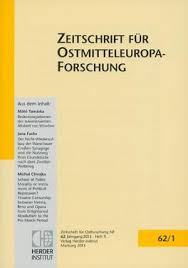Grenzen ziehen und überschreiten. Ärzte und das Jüdische im Königreich Polen während der Choleraepidemie 1892/93
Creating and Crossing Boundaries. Medical Doctors and Jewishness in the Polish Kingdom during the Cholera Epidemic of 1892/93
Author(s): Katharina Kreuder-SonnenSubject(s): Jewish studies, Health and medicine and law, Sociology of Culture, 19th Century
Published by: Verlag Herder-Institut
Keywords: Creating;Crossing Boundaries; Medical Doctors; Jewishness; Polish Kingdom; Cholera Epidemic; 1892/93;
Summary/Abstract: The European cholera pandemic of the 1890s reached the Polish Kingdom in 1892. As in many other places, it was a phenomenon which challenged social, ethnic, religious and national cohesion. This paper analyzes how cholera effected the relationship of Christian and Jewish Poles in this time period. It focuses on medical doctors and sheds light on their discourses and practices concerning Jewishness. In its first part, the paper shows that religious difference received special attention from medical authors writing about the cholera epidemic. Descriptions of towns struck by cholera specify the Jewish share of the population and differentiate the number of victims according to religious belief. Furthermore, medical texts about the cholera epidemic assign Jews a special role in relation to it. The greater share of the victims usually was Jewish and they are (sometimes implicitly) blamed for distributing the disease. Medical authors then go on to ask why cholera rages mostly among Jews. The paper analyzes the cholera report of the physician Ludwik Czarkowski of Siemiatycze in detail in order to find out which characteristics he assigns Jews that explain their higher susceptibility to cholera infection. Czarkowski makes Jewishness mostly a socio-cultural category: The sick Jews are very poor, they live in dirty huts, and they have little idea of hygiene. The description of Jews as a socio-cultural category can also be found in other medical texts about the cholera epidemic. Czarkowski, however, finds that it does not explain everything. In Siemiatycze, he finds very poor Jews who do not fall ill and he finds Jews who are very well nurtured but get infected all the same. He identifies several other factors (and this is very typical for a pre-bacteriological style of thinking about epidemics) which influence the course of cholera. In this chaos of possible disease factors Czarkowski turns as a last resort to the idea of a Jewish “usposobienie” in order to explain their higher share of cholera victims. The term hints first of all at ideas about a different Jewish physique which is more susceptible to disease. The majority of medical cholera writing, however, creates the Jewish Other as a socio-cultural category. The paper shows in its second section that such socio-cultural Othering may be understood as a national Othering as well. In the context of a positivist national discourse and a nationalized hygienic movement Polish nationhood became connected to an idea of modernity which did not only encompass scientific progress and industrialization but health and hygiene as well. Sickness, unhygienic behavior, and any other sort of cultural “backwardness” was excluded from such a concept of the Polish nation. In its third part, the paper shows that this socio-cultural, and possibly national, Othering during the cholera epidemic did not effect the relationship of Christian and Jewish doctors in the Polish Kingdom. When they adapted to the medical “thought collective”, Jewish doctors became an integral part of the professional group of Polish physicians. Jews belonged to the Warsaw Medical Society and did not form their own medical association. The paper identifies twenty-three Jewish members of the Society from the last twenty years of the 19th century. Tracing their biographies it becomes clear that Jewish physicians followed career paths similar to their Christian colleagues. They participated in the culture of academic travel and went abroad to study; and they were hired in the same university clinics and city hospitals afterwards. When they worked in Jewish hospitals they nevertheless belonged to the Polish medical community and actively participated in Warsaw’s hygiene movement. During the epidemic Jewish and Christian doctors found it natural to cooperate. Thus the socio-cultural categorization of Jewishness was open to religious indifference – if Jews adapted to norms of Polish modernity. When the boundary drawn between Jews and Christians became less permeable after the turn of the century, this changed medical cooperation as well. In 1907 the Warsaw Medical Society decided not to accept new Jewish members any longer.
Journal: Zeitschrift für Ostmitteleuropa-Forschung
- Issue Year: 64/2015
- Issue No: 3
- Page Range: 330-355
- Page Count: 26
- Language: German

